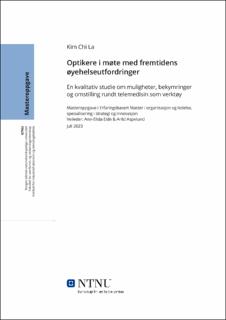| dc.description.abstract | Denne masteroppgaven tar for seg muligheter og bekymringene det har på optikerne rundt løsningsforslaget hvor de kan få tildelt et større pasientansvar ved hjelp av teknologi. Bakgrunnen for studiet er den økende demografien av eldre som vil ha behov for øyehjelp og mangelen på øyeleger. Som tidligere optiker og nå masterstudent innen organisasjon og ledelse ble jeg inspirert av interpellasjonen holdt av Sveinung Stensland (H) til helseministeren i Stortinget. Her ble det fremmet et forslag hvordan optikerne kunne være en del av løsningen i møte med fremtidens øyehelseutfordringer.
Forskningen presenteres som en case studie med kvalitativ tilnærming, hvor et semistrukturert intervju retter fokuset på det fenomenologiske blant optikere. SDI-modellen fra Aksel Tjora har lagt grunnlaget for koding av studiets datainnhold som sammen med empirisk data har bidratt til å forme en helhetlig oppgave.
Den teoretiske forankringen presenterer blant annet Lewins endringsmodell, de emosjonelle stadiene i «The change curve» av Kübler Ross, ti årsaker til motstand og fire tiltak for håndtering av destruktiv motstand av Jacob og Thorsvik samt Kotters åtte forutsetninger for vellykket endring. Grunnet løsningsforslaget som ikke er igangsatt vil ikke studiet ta for seg endringsprosessens deler som gjelder organisatorisk struktur og kultur for gjennomføring samt makt og politikk. Begrensningen i studiet inkluderer også hvordan en konsoliderer stillingen og sørger for mer endring samt sikrer en forankring av endringen i ny bedriftskultur.
Resultater viser til positiv innstilling blant optikere for gitte løsningsforslag. Deres endringsvillighet skyldes de mange fordelene telemedisin og økt pasientansvar kan medføre for både optikere, øyeleger, pasienter og samfunnskostnader. Arbeidsendring og samhandling med øyeleger kan dog medføre utfordringer hvor kompetanse og opplevd mangel av anerkjennelse fungerer som barrierer. Samtidig vil det kunne by på muligheter som bedre utnyttelse av ressurser, kunnskapsdeling og en smidigere pasientreise. Funn indikerer blant annet at ledere som har en karismatisk tilnærming, inkluderer til medvirkning og har et høyt fokus på kommunikasjon øker muligheter for å lykkes med endring hos optikerne. | |
| dc.description.abstract | This master's thesis deals with the possibilities and the concerns that opticians have about the proposed solution where they can share greater patient responsibility with the help of technology. The background for the study is the growing demographic of the elderly who will need eye care and a shortage of ophthalmologists. As a former optician and now a master's student in organization and management, I was inspired by the interpellation given by Sveinung Stensland (H) to the Minister of Health in the National Assembly, Stortinget. Here, a proposal was put forward as to how opticians could be part of the solution in the face of future eye health challenges.
The research is presented as a case study with a qualitative approach, where a semi-structured interview focuses on the phenomenological among opticians. The SDI model from Aksel Tjora has laid the foundation for coding the study's data content, which, together with empirical data, has contributed to form a comprehensive task.
The theoretical grounding presents, among other things, Lewin's change model, the emotional stages in "The change curve" by Kübler Ross, ten causes of resistance in change and four measures for handling destructive resistance by Jacob and Thorsvik as well as Kotter's eight prerequisites for effective change. Because the proposed solution has not been initiated, the parts of the change process that apply to organizational structure and culture for implementation, nor power and politics will not be studied. The limitation of the study also includes how one consolidates and ensures more change as well as ensuring of the change in the new company culture.
Results indicate a positive attitude among opticians for the given solution proposals. Their willingness to change is due to the many benefits telemedicine and an increased patient responsibility can bring to opticians, ophthalmologists, patients and societal costs. A change of work and interaction with ophthalmologists can, however, cause challenges where competence and a perceived lack of recognition act as barriers. Even so it will be able to offer opportunities such as better utilization of resources, knowledge sharing and a agile patient journey. Findings include that leaders who have a charismatic approach, includes for participation and who have a high focus on communication increases the chance of successful change with the opticians. | |
